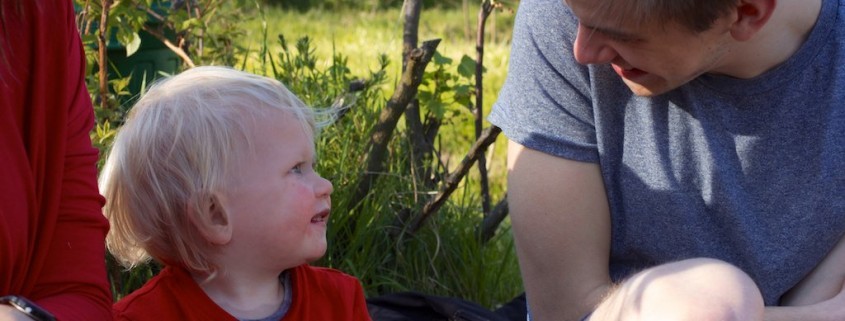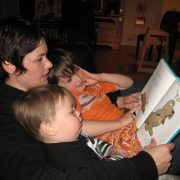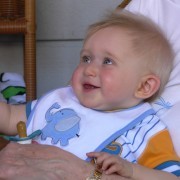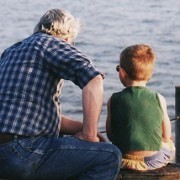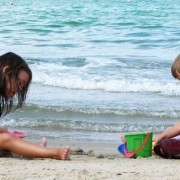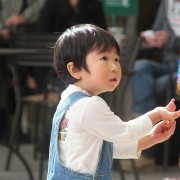Speech Development from 8 months
Last week we looked at how language develops from birth to 8 months, let’s look at what happens next….
Between 8 – 14 months, babies become more interested in looking at books, and by 14 months they are often able to locate known objects eg ‘Where’s the dog?’ and they will point at it. They will understand often said words (known as Receptive language)eg Mum, Toby (the dog) bottle; and around their first birthday can say 4 -6 words (known as Expressive language). These ‘words’ aren’t complete, but may be ‘bo’ for bottle or ‘woof’ for the dog. Children of this age will listen, briefly. They may respond to simple requests eg ‘Come to Mummy’. They often jabber away to themselves or to you, and like to talk whilst looking at themselves in front of a mirror. They use gestures to make their needs known eg pointing at the fruit bowl when they want a banana.
How you can help: Share and read books to them, pointing out objects – the car, the big tree etc, and ask simple questions about the book: ‘Where’s the cat?’ Notice what you child is doing, and label it for him eg : You are playing with blocks’ or ‘You are eating porridge’. Let your baby sit in front of a mirror, to see themselves and ‘talk’! Sing simple songs to him. Listen when he is ‘telling’ you something – your smile and reponse encourages him to keep practising.
From 14 – 24 months they move from mostly babble (around their first birthday) to mostly words (around their second birthday). By age 2 they will have a vocabularly of about 20-30 words, which may not all be clearly expressed, but are understood. At 2 they are often making 2 word sentences eg ‘Me do’ or ‘Daddy car’. Toddlers are able to follow one step directions (if they are in the mood to do so!)
How you can help: In daily activities, ask simple open-ended questions. Open ended questions are question which don’t have a yes/ no answer. This helps the child to use words rather than maybe shaking their head or nodding. Eg ‘Would you like milk or water’, ‘Shall we play with the blocks or go outside?’ If your toddler points at things, give him the word for the object eg ‘Oh, you want the blue cup’. This helps with expanding their vocabularly. Limit TV time – while they may be learning words there, they don’t talk themselves – there is no conversation happening and so they don’t get a chance to practise. Listen to your child – even when you can’t understand his words – you my need to ask questions to word it out, or say: ‘Show Mummy what you want’.
Between their second and third birthdays language grows very quickly. By 3 they have a receptive language (what they understand) of between 300 -1,000 words!, and an Expressive language (what they say) of between 150 – 300 words. By age 3 speech should be fairly clear, and should be able to be easily understood by people other than family. Three year olds love to ask questions – they are curious about the world and want to know ‘why?’ and ‘ how?’ and ‘how come?’ At age 3 they are saying 4 word sentences. They understand actions and events in simple story books. By 3 they often recognise simple written symbols in the environment eg the sign for your supermarket, or the road sign at the turn off to Grandma’s house.
How you can help: Provide a variety of books, and read to them every day – make it part of your quiet time before bed. Add to your child’s word – if they say ‘Daddy go’, you could say: ‘Yes, Daddy’s gone to work.’ – so that you stretch their language by adding a little more. Introduce plurals eg one sock, two socks. Respond quickly to their questions (and there may be many!) – they learn so much from the answer you give (and from your attitude to learning).
It is well known that the amount of positive language input in the early years leads to a more comprehensive vocabulary. Encourage your children with kind words, gentle words, fun words and lots of smiles!
Happy Talking!
— Image by Richard Leeming via Flickr
